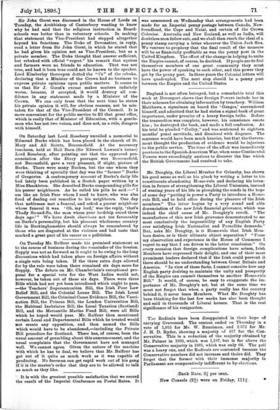On Tuesday Mr. Balfour made his promised statement as to
the course of business during the remainder of the Session. Supply was not as forward as it ought to be owing to the long -discussions which had taken place on foreign affairs without a single vote being taken. If the three extra days allowed for by the rule were taken there remained six days more for Supply. The debate on Mr. Chamberlain's exceptional pro- posal for a special vote for the West Indies would not, however, be taken out of these six days. There were three Bills which had not yet been introduced which ought to pass, —the Teachers' Superannuation Bill, the Irish Poor Law Relief Bill, and the Colonial Loans Bill. The Irish Local Government Bill, the Criminal Cases Evidence Bill, the Vacci- nation Bill, the Prisons Bill, the London Universities Bill, the Habitual Inebriates Bill, the Local Taxation (Scotland) Bill, and the Mercantile Marine Fund Bill, were all Bills which he hoped would pass. Mr. Balfour then mentioned certain Local and Departmental Bills which he trusted would not oreate any opposition, and then named the Bills which would have to be abandoned,—including the Private Bill procedure for Scotland. There has, of course, been the usual amount of grumbling about this announcement, and the usual complaints that the Government have not managed well. We cannot agree. Given the nature of the machine with which he has to deal, we believe that Mr. Balfour has got out of it quite as much work as it was capable of producing. No foreman can get rapid work out of his gang if it is the master's order that they are to be allowed to talk as much as they like.


































 Previous page
Previous page